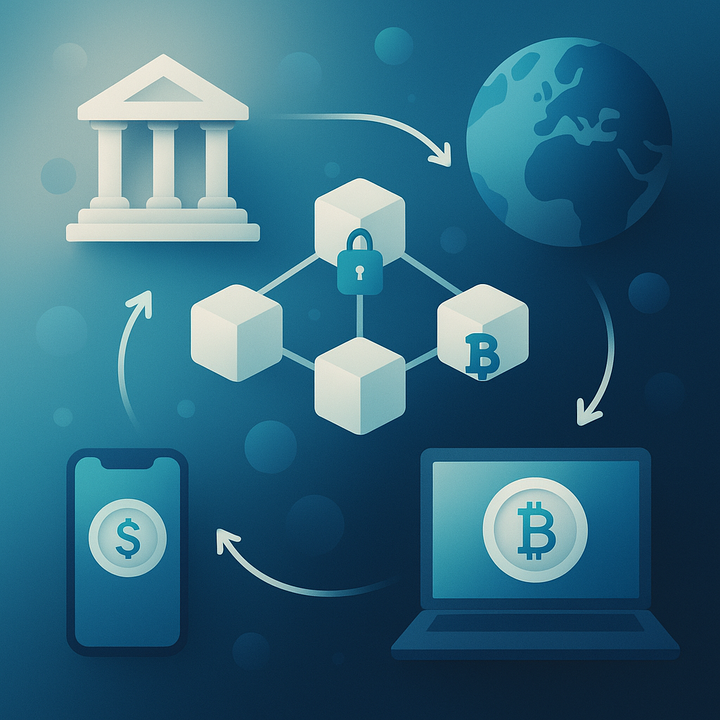FinTech and Financial Innovation 2025 mark a turning point in the global financial ecosystem. As technology accelerates and reshapes economies, the way people save, invest, and transact is undergoing an unprecedented revolution. From mobile payments to artificial intelligence and blockchain, innovation has become the driving force behind a new era of financial inclusion and transparency.
In this dynamic landscape, FinTech is no longer a disruptor — it is the foundation upon which modern financial systems are being rebuilt. Banks, startups, and regulators worldwide are collaborating to create faster, smarter, and more secure financial environments. This article explores how technology in 2025 is redefining the future of money and unlocking opportunities for businesses and consumers alike.
The Evolution of FinTech
Financial technology has evolved dramatically over the past decade. What began as an attempt to digitize banking has grown into a global movement spanning payments, lending, insurance, and investing.
Between 2010 and 2025, FinTech funding skyrocketed from under $10 billion annually to more than $400 billion, signaling a permanent transformation in how capital moves. The rise of mobile-first banking, peer-to-peer lending, and blockchain-based applications has democratized access to finance and eliminated barriers that once excluded millions.
By 2025, FinTech has achieved mainstream adoption across all sectors. It is no longer an option — it is an expectation. Consumers demand instant payments, 24/7 access, and personalized services that traditional banking systems can no longer provide on their own.
Key Areas of FinTech Transformation in 2025
1. Digital Banking and NeoBanks
The rapid expansion of digital-only banks — known as NeoBanks — continues to reshape the banking industry. These platforms operate without physical branches, offering low fees, real-time analytics, and user-friendly interfaces. In 2025, NeoBanks such as Revolut, N26, and Nubank have become global powerhouses, providing savings, investments, and even crypto trading under one digital roof.
2. Blockchain and Decentralized Finance (DeFi)
Blockchain has matured beyond its cryptocurrency roots. In 2025. it powers decentralized finance applications that enable direct, peer-to-peer transactions without intermediaries. DeFi platforms allow users to borrow, lend, and earn yields securely through smart contracts. Tokenization — converting real assets like real estate or commodities into digital tokens — has become a major trend, unlocking liquidity for investors and entrepreneurs alike.
3. Artificial Intelligence in Financial Services
AI is now central to FinTech operations. From predictive analytics for credit scoring to real-time fraud detection, AI improves both security and efficiency. Chatbots and virtual advisors enhance customer experience by providing instant, personalized financial guidance. At the same time, algorithmic trading platforms use machine learning to identify profitable opportunities and minimize human error.
4. RegTech: Regulation Through Automation
With innovation comes complexity. Regulatory Technology (RegTech) has emerged to help institutions comply with ever-changing financial laws. AI-driven compliance monitoring automatically detects suspicious transactions, prevents money laundering, and ensures transparency. This technology reduces the burden of manual auditing, allowing firms to focus on innovation while maintaining trust.
5. Embedded Finance and Open Banking
The concept of “finance everywhere” defines 2025. Through open APIs, financial services are now embedded directly into e-commerce, social media, and even health apps. Consumers can make investments, secure loans, or purchase insurance seamlessly without visiting a traditional financial platform. Open Banking frameworks, now adopted across Europe, Asia, and the Americas, give consumers full control over their financial data and empower new business models.
The Impact of FinTech on Global Inclusion
FinTech’s greatest achievement is its ability to expand financial inclusion. In 2025, over 1.7 billion previously unbanked people now have access to financial services through mobile platforms. Digital wallets, micro-lending, and payment apps have bridged the gap between rural populations and the formal economy.
In regions like Africa and Southeast Asia, FinTech solutions such as M-Pesa and GCash are transforming lives by enabling small businesses to operate, pay suppliers, and access credit instantly. The democratization of finance has fostered entrepreneurship and reduced poverty through empowerment rather than dependence.
Furthermore, blockchain-based identity systems are helping individuals without traditional documentation to access banking securely — proving that innovation can drive inclusion as well as profit.
How FinTech Is Reshaping Investment Strategies
Investing in 2025 looks radically different from just five years ago. FinTech platforms provide investors with unprecedented control, flexibility, and information.
Robo-advisors manage portfolios using AI, offering customized strategies based on personal goals and risk tolerance. Fractional investing allows users to buy small portions of high-value assets like tech stocks or real estate.
Crowdfunding and peer-to-peer investing also continue to grow, giving startups access to capital while letting everyday investors participate in early-stage opportunities. Combined, these innovations have democratized wealth creation and blurred the line between institutional and retail investors.
Security, Privacy, and Ethical Considerations
As FinTech evolves, so do its challenges. Cybersecurity remains a critical issue in 2025, with financial institutions investing heavily in encryption, biometric authentication, and decentralized data storage.
Privacy regulation is also tightening. Frameworks such as Europe’s GDPR and America’s evolving data privacy acts require FinTech companies to prioritize user consent and transparency. Meanwhile, ethical debates surrounding algorithmic bias and automated lending highlight the need for responsible AI governance.
Trust, therefore, has become the cornerstone of innovation. Successful FinTechs are those that balance speed and convenience with security and integrity.
The Role of Governments and Regulation
Regulation has adapted to match innovation. In 2025, most developed markets have established dedicated FinTech oversight bodies. Central banks collaborate with startups to pilot Central Bank Digital Currencies (CBDCs), bridging the gap between traditional finance and emerging technologies.
Countries like Singapore and the UK lead in regulatory sandboxes — controlled environments that allow FinTech firms to test products safely. These initiatives encourage innovation while ensuring consumer protection and financial stability.
Governments are also prioritizing cybersecurity and digital identity infrastructure, recognizing that public trust in FinTech is vital for economic growth.
The Rise of Sustainable and Green FinTech
Sustainability has become a defining theme in FinTech and Financial Innovation 2025. Green FinTech solutions use data to measure carbon impact, promote eco-friendly investments, and finance renewable projects.
Apps now track individual carbon footprints and suggest sustainable financial actions, such as offsetting emissions or supporting green bonds. ESG (Environmental, Social, and Governance) metrics are integrated into investment platforms, enabling users to align portfolios with personal ethics and planetary health.
This intersection between sustainability and technology is shaping a new generation of conscious investors who see profitability and responsibility as complementary goals.
Global Outlook: The Next Chapter for FinTech
As 2025 unfolds, the boundaries between finance and technology continue to fade. FinTech is becoming an invisible yet essential layer of daily life — embedded in every digital interaction, transaction, and decision.
In the coming years, expect deeper integration of AI, real-time payment systems, and decentralized finance, creating a world where money moves freely, securely, and inclusively. The rise of quantum computing and 5G networks will accelerate these trends, enabling instant global transactions with near-zero friction.
Conclusion
FinTech and Financial Innovation 2025 redefine the essence of money, trust, and accessibility. The fusion of technology and finance is empowering billions, challenging outdated systems, and setting new standards for transparency and efficiency.
Those who embrace these innovations today are not just participating in a financial revolution — they are shaping it. The future of finance belongs to those who understand that progress comes from combining innovation with integrity.



